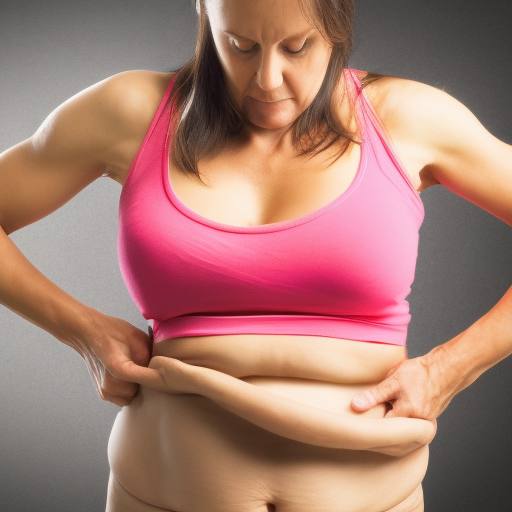Ovary Belly Fat - PCOS and Belly Fat

Your body might enlarge in the ovary area of your stomach, and it might be for several reasons, such as:
- Polycystic ovary syndrome (PCOS),
- Bloating,
- Constipation,
- Excessive weight (belly fat),
- Overeating,
- Other more rare causes.
If you are certain that your body expanding in your ovary area is not due to constipation, overeating, or bloating, you can continue reading to learn more about what can be done with belly fat in this area and what is PCOS belly fat.
What is belly fat and how it impacts on overall health
Belly fat is fat that forms around organs in your stomach and chest.
The other, more scientific name for it is “visceral fat.”
It is especially harmful for your health as it prevents your organs from functioning normally.
The most dangerous effect it has on your heart is when it builds up around it and your heart is unable to perform normal beats. This leads to various types of cardiovascular diseases.
The second most affected body part is your lungs, as the fat wraps around your lungs and you can no longer breath with a full chest.
The third one is metabolic dysfunction, which includes hyperglycemia, (high blood sugar), dyslipidemia (high serum triglycerides), and low HDL (high-density lipoprotein, which is a “good” cholesterol)
Among already mentioned, there are other serious conditions that belly fat can promote:
- Vascular diseases
- Alzheimer’s disease
- Diabetes: type 2
- Asthma
Why does belly fat in the ovary area put women’s health at risk?
The direct link is found between women considered overweight and serious illnesses.
Visceral fat that is being accumulated around the ovaries puts a direct risk to women’s health. It contains toxic chemical compounds and hormones.
This means that all of this fat is intended to harm the ovaries and cause a variety of diseases.
One of the severe illnesses it causes is Polycystic Ovary Syndrome or PCOS.
Most frequently PCOS is caused by overweight or ovary belly fat.
Continue reading to find out what you can do to prevent PCOS belly fat and reduce visceral fat in the ovary.
What is a PCOS Belly Fat?

PCOS is most commonly diagnosed in women during their reproductive years.
It damages the hormonal system. As a result, it introduces a variety of issues throughout the body.
Women that are affected by this disorder are known to have more male hormones or androgens, way above the norm. So it causes body hair to grow everywhere, painful eczema and even baldness.
However, this can be prevented by keeping the body weight at a normal level.
Why might you have a PCOS belly?
There are many reasons why you could have this condition.
Some most often are listed below.
Hormonal imbalances
Visceral fat is toxic and harms your hormonal system.
It introduces dangerous chemical compounds into your bloodstream, and your whole body suffers from poisoning.
It tightens your blood vessels and decreases blood flow to the organs, thus influencing their functioning.
As a result, it starts an inflammatory process in your whole organism.
Poor diet and lack of exercise
If your main source of food is fast-food chains or delivery, then you increase a chance of having an ovary belly fat. Study has shown that high sugar food increases risk of having PCOS.
Such foods are typically high in sugar to stimulate appetite. Although it is tasty, it is proportionally harmful. So if you decide to continue indulging in such products, just remember that this is one of the trade-offs that you have to deal with later.
Even if you can’t refuse it, at least you can try to eat such products less often, which will have an immediate positive effect.
Exercising at least 30 minutes a day two to three times a week will significantly reduce the chance of having a PCOS. Aerobic and strength training activities such as jogging, walking, cycling, and lifting can also help relieve symptoms.
Genetics
There is very weak genetic correlation in people that have PCOS.
The linked study has shown that the chance of having the illness in the single family is very low.
Nevertheless, this disease is very complex, and research to find out more about it is still ongoing.
Menopause
Menopause occurs when a woman’s monthly periods end and she is no longer able to give birth.
Studies have shown that PCOS syndrome is quite often seen in women after their 40s and later.
After a certain age, this condition shifts from being a reproductive illness to a systemic metabolic disorder.
Stress
Stress is a precursor to many diseases. So PCOS is one of them.
A study has shown that the illness is directly correlated with stress.
Later in the article, we will talk about methods to reduce stress.
What does a pcos belly look like?
Ovary belly fat hangs around the pelvis area.
For example, it might look like this:

Sometimes it is called beer belly or apple-shaped body:

Know that even those who seem to be thin still might have belly fat, as it is hidden inside, around internal organs.
Why is it so hard to lose weight with PCOS?
It is hard to lose weight with polycystic ovary syndrome because it promotes insulin resistance.
Insulin resistance makes losing weight way more difficult as it leads the body to keep fat rather than burn it for energy.
It also increases cravings and appetite, which makes it difficult to eat healthier.
Furthermore, those with insulin resistance may lose muscle mass, so it becomes even harder to burn calories.
How can I get rid of my PCOS belly?

Before dealing with the ovary belly, it is important to get PCOS treatment to get substantial results quicker.
Usually, the most powerful methods include:
- The most famous is combined oral contraceptive pills or “Birth control pills”
- Medication for diabetes
- Treat any other symptoms that may be impeding your progress.
After that you are free to start experimenting with exercises and dieting to find ones that suits you best.
How do you get rid of belly fat on ovaries?
The truth is that weight loss cannot occur in one area.
In order to lose belly fat on the ovaries, you have to aim for minimizing the total amount of visceral fat.
The good news is that visceral fat goes away first and it is easier to get rid of.
Calorie tracking
The most simple and time-proven method to lose weight is by tracking calories.
Track how much you burnt in exercise and consumed with food.
For this purpose we recommend to use Calorie Tracker app .
Just by tracking it daily can increase your awareness about your habits and bring positive changes to your life.
A study of overweight people found that using calorie-tracking apps resulted in consistent weight-control results.
Many respondents reported that even if they were not ready to make changes, simply by logging in calories, they noticed a good impact.
Another study has shown that it is among the most potent tools available today to fight obesity.
Consider changing lifestyle
If you lead a sedentary lifestyle, seriously re-evaluate your mobility patterns.
Doctors recommend taking frequent, several-minute walks during the day. This alone brings lots of improvements to your health.
Besides movement it also gives you an opportunity to get fresh air and improve your mood.
Relax
As mentioned earlier, stress is one of the PCOS entry ways. Therefore, try as much as possible to reduce exposure to stress.
The most common method to reduce stress is meditation and practicing gratefulness. Another method to try are positive affirmations.
Medications and hormone therapy
Hormone treatment is usually when you take hormones prescribed by a doctor (endocrinologist) in the form of pills, injections, or skin patches to help balance your body’s hormone levels.
The most famous pills for PCOS are clomiphene and metformin. To read about their side effects check this link.
Surgery as a last resort
If you feel utmost uncomfortable by symptoms caused by PCOS and ovary belly fat, the last resort would be minimally invasive surgery called laparoscopic ovarian drilling.
It is proven that this procedure helps to restore the normal function of ovaries.
Regarding the excessive visceral fat it is possible to perform fat liposuction surgery, which also greatly improves a patient’s condition.
Conclusion
Why is it critical to address ovary belly fat to maintain your health?
It is especially important to keep your ovary belly fat at normal levels for women who plan to give birth. Because it may severely impair the organism’s pregnancy function.
Besides pregnancy, if you have belly fat in the ovary area it might introduce various health issues.
The only person that can help you with this issue professionally
Always consult with a professional, such as your doctor. Be sure to visit your chosen healthcare provider before taking any serious medications or making any lifestyle changes. If your current doctor does not meet your expectations, there are various ways to switch doctors. It is always encouraged to visit different specialists.
Sources and additional information
- https://www.healthdirect.gov.au/how-to-reduce-visceral-body-fat-hidden-fat
- https://academic.oup.com/jcem/article/92/7/2500/2598230
- https://www.ncbi.nlm.nih.gov/pmc/articles/PMC5892097/
- https://pubmed.ncbi.nlm.nih.gov/25411807/
- https://pubmed.ncbi.nlm.nih.gov/12082210/
- https://pubmed.ncbi.nlm.nih.gov/20453076/
- https://pubmed.ncbi.nlm.nih.gov/28203719/

